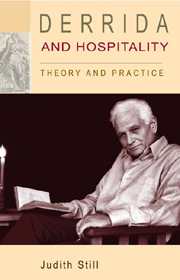Book contents
- Frontmatter
- Contents
- Acknowledgements
- Abbreviations
- 1 Introduction to the question of hospitality: ethics and politics
- 2 Patriarchs and their women, some inaugural intertexts of hospitality: the Odyssey, Abraham, Lot and the Levite of Ephraim
- 3 Friendship and sexual difference: hospitality from brotherhood to motherhood and beyond
- 4 Frenchalgeria – (not) asking for a name, naming, calling by name in tales of Algerians
- 5 The dangers of hospitality: the French state, cultural difference and gods
- 6 Animals and what is human
- 7 Concluding around hospitality
- Bibliography
- Index
4 - Frenchalgeria – (not) asking for a name, naming, calling by name in tales of Algerians
Published online by Cambridge University Press: 12 September 2012
- Frontmatter
- Contents
- Acknowledgements
- Abbreviations
- 1 Introduction to the question of hospitality: ethics and politics
- 2 Patriarchs and their women, some inaugural intertexts of hospitality: the Odyssey, Abraham, Lot and the Levite of Ephraim
- 3 Friendship and sexual difference: hospitality from brotherhood to motherhood and beyond
- 4 Frenchalgeria – (not) asking for a name, naming, calling by name in tales of Algerians
- 5 The dangers of hospitality: the French state, cultural difference and gods
- 6 Animals and what is human
- 7 Concluding around hospitality
- Bibliography
- Index
Summary
Thus he speaks to her in an intimate manner, in the second person singular, using a multitude of given names that he had transformed over the years. The desire to baptize her every time he was overcome with tenderness. Was he trying in some obscure way to make her lose her own first name? Why was he so determined to keep the privilege of naming her in this definite, casual, and terrible way?
In the long run, his violence, speaking in the name of love, would frighten him, would affect him more profoundly than he guessed in a destructive cycle.… As long as he was giving her names, she always said: either Yes. As soon as she was unnamed, she became a child again and surprisingly began to stammer.
(Ainsi, il la tutoyait, avec une multitude de prénoms qu'il avait transformés au cours des années. Désir de la baptiser chaque fois qu'il débordait de tendresse. Cherchait-il obscurément à lui faire perdre son prénom? Pourquoi, avec un tel entêtement, maintenait-il cette liberté de la nommer, à coup sûr, désinvolte et terrible?
A la longue, cette violence, qui parlait au nom de l'amour, allait l'effrayer lui-même, pour l'atteindre plus loin qu'il ne devinait, en un cercle destructeur.… Tant qu'il la nommait, elle disait infiniment: Oui. Sitôt innommée, elle retombait dans l'enfance et un étonnant bégaiement.)
This chapter will raise the question of names in a range of different contexts of (in)hospitality, but in order to focus the topic (potentially enormous) I shall keep returning to Algeria and to the French (uninvited guests).
- Type
- Chapter
- Information
- Derrida and HospitalityTheory and Practice, pp. 143 - 186Publisher: Edinburgh University PressPrint publication year: 2010



